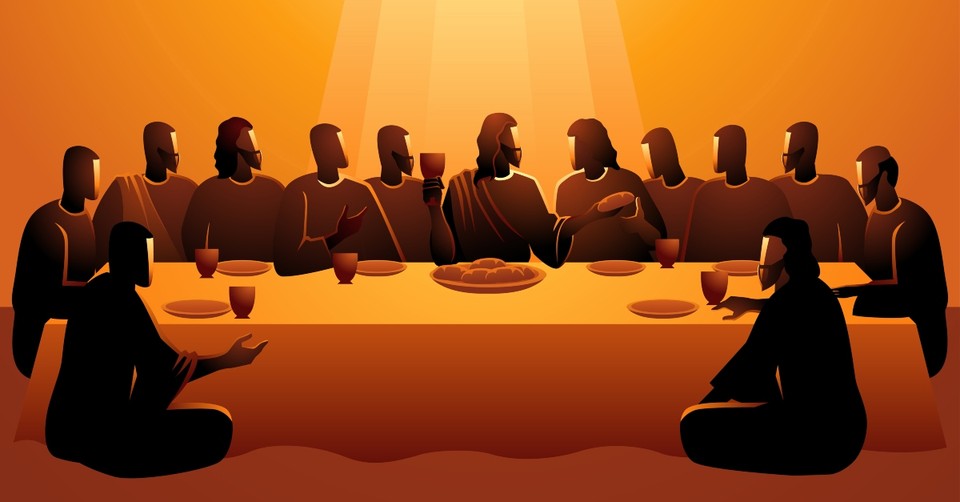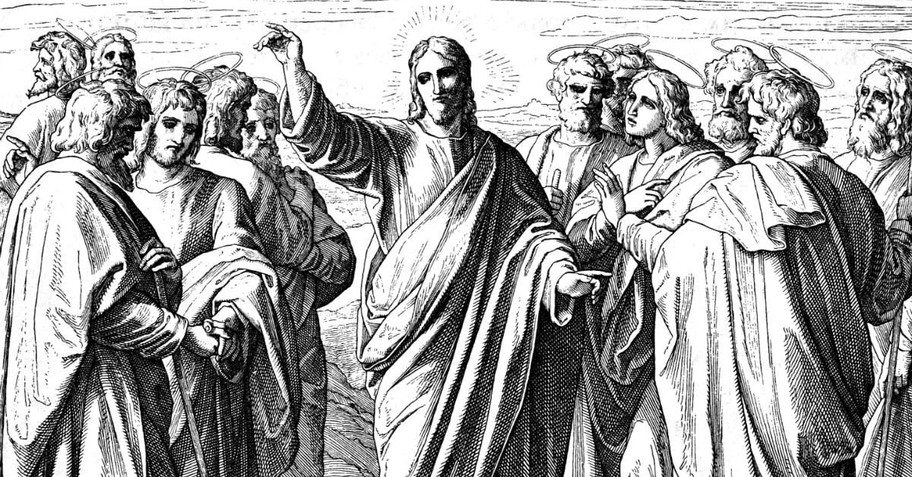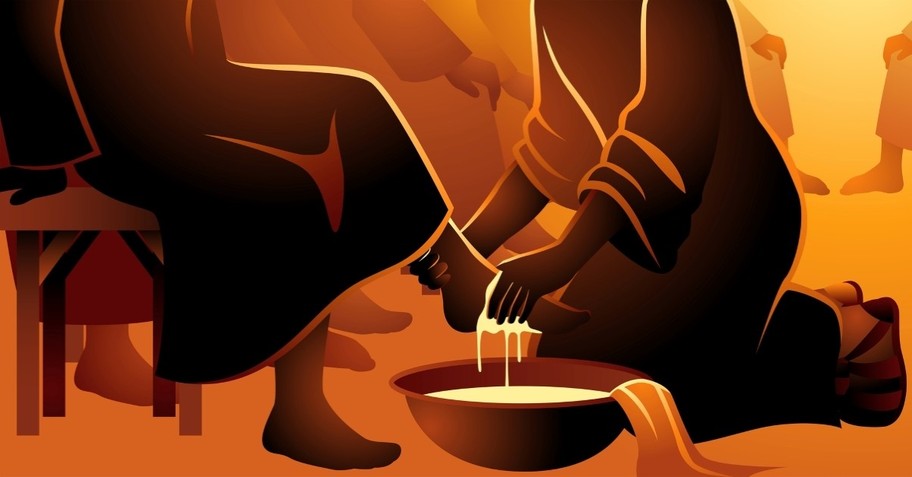What Jesus Showed Us During the Last Supper about Serving Others

Many years ago, due to an illness that resulted in a hospital stay, I missed the first two weeks of tenth-grade chemistry. During that essential time, my fellow classmates learned the foundations of chemistry—the 118 symbols and the elements they represented. When I returned, still weak and feeling a little groggy, the teacher went over previously learned information in rapid-fire succession, then paused and said, “Does the class understand?”
I raised my hand. “No,” I answered. “I don’t.”
My fellow classmates groaned, but I couldn’t understand because I hadn’t had enough time to “get it.”
When Jesus Taught the Basics
During His ministry, Jesus taught His disciples and others—sometimes straightforward and at other times using made-up stories and what must have seemed like riddles. I have to wonder if often the disciples asked one another, “Did you understand that?” We know from Scripture that they were often left amazed and confounded by the Teacher’s parables and lessons. There were times, such as when Jesus told the disciples about His upcoming death, burial, and resurrection, (see Luke 18: 31-34) that the disciples simply didn’t, as we say today, “get it.”
But on one evening, sitting in an upper room while eating a special holiday meal, words became hardly necessary . . . and yet, because the disciples could not fully comprehend, Jesus had to explain His actions with words. . .and then, later, His words with an ultimate action.
Photo Credit: ©Getty Images/rudall30
The Gospel Writers Agree
Ask three witnesses to tell you the exact same story, and what you will receive is three versions of the same event. Ask four... and, well...
Out of the nearly 220 recorded events that create the four-gospel narrative of Jesus’ life and ministry, only 15 are recorded by Matthew, Mark, Luke, and John. Eleven of those take place in the short span of “three days,” beginning with the Passover supper (also known as the seder), or as Christians refer to it, the Last Supper (Matthew 26:20-30, Mark 14:17-26, Luke 22:14-30, John 13:21-30). These four accounts are nearly line for line the same with only small exceptions.
According to Luke, Jesus declared that He was eager to eat this meal with His disciples (22:15). He also stated that He would not eat this meal again until “it’s meaning was fulfilled” (22:16). Indeed, in the seder, we see much of the symbolism of Jesus’ death, burial, and resurrection. Also, in Luke’s gospel, the wine is poured first, the bread broken (the other three record this is reverse). And then . . . an argument ensues between the Twelve.
Matthew does not record the argument but goes into detail concerning Judas as the man who would betray Jesus before the night’s end (26:23-25). Again, in Mark’s gospel the argument is not mentioned. But when Jesus tells of His betrayal, the disciples ask, “Am I the one?” (14:19)
John’s gospel focuses on what Jesus knew.
He knew His hour had come (13:1).
He knew the Father had given Him authority, that He had come from God, and would return to God (13:3).
He knew who would betray Him (13:11) and those whom he had chosen who would not fall away.
Judas aside, the remaining disciples would start and lead the original Jesus revolution. These unusually chosen men had followed a “rogue Preacher” for over three years. They were not highly schooled in much outside of their trade or scholastically trained for ministry and, at the time of the seder, did not “get it.” But soon enough, they would turn the world upside down for Jesus.
But then, in that designated room for this holy meal, they would squabble. According to Luke’s gospel, they went from the surety that none of them could ever, would ever, betray their Master, their Rabbi, their long-awaited Messiah.
Their friend.
Until the “and then.” Luke records that, with Jesus sitting right there, they began to bicker among themselves as to who would be the greatest among them.
Gracious.

Mom Always Liked You Best
Those of us who are old enough might remember the antics of The Smothers Brothers—Tom and Dick—a couple of siblings who entertained with their comedy and their folk tunes. But if Tom ever began to act up (which was part of the show) and had to be corralled by his younger brother, he’d snap back with, “Well, Mom always liked you best!”
I think of their act every time I read of the disciples fussing among themselves.
Luke’s gospel tells us that Jesus said to them, “The kings of the Gentiles lord it over them; and those who exercise authority over them call themselves Benefactors. But you are not to be like that. Instead, the greatest among you should be like the youngest, and the one who rules like the one who serves. For who is greater, the one who is at the table or the one who serves? Is it not the one who is at the table? But I am among you as one who serves” (22:25-27, emphasis mine).
Was this not enough, these words? Was this not understood, this teaching?
Apparently not.
The Questions God Asks
In 2017, after discovering information about a prayer labyrinth, I began to study the questions God asks throughout the Bible. After examining the scriptures connected with each, I then turned the questions inward and journaled my answers to God. A year later, I began teaching this concept, and then, in 2022, my book The Third Path released, which takes a look at 26 of the numerous questions from God to man.
I have continued to study these questions and, recently, while reading the Word, came across a question from God that punched me in the stomach.
Do you understand what I was doing?
Photo Credit: Ruskpp
Out of Time, Time for Action
By the evening of this final seder, Jesus had nearly run out of time. Had the disciples said, “I’m confused” three years earlier or even the year before would have been one thing. But now, with time running out, Jesus must have known that He had to do more than tell a parable or explain with a metaphor. Now, it was time for action.
In ancient days, because the men and women of Israel wore sandals as they walked along dirt roads, they entered homes with dusty feet. If they did so in which a servant was employed, the servant would immediately wash the guest’s feet, then wipe them. Wives often did this for their husbands. It was considered a lowly job because it was a dirty job.
Yet, here was Jesus with His disciples (who would have already washed their feet before the meal), now standing, disrobing, wrapping a towel around His waist, and then stooping to wash the feet of the men who had been arguing about their greatness.
Here was God incarnate, the Creator of the universe, the stars and the galaxies, the mountains and valleys, the rivers and oceans and all the creatures therein, the wide-open sky with all the many varieties of birds under its arch . . . here was Jesus dropping to the role of a servant.
He’d talked enough. Now was the time for action.
“Do you understand,” he asked after washing their feet and replacing His robe, “what I was doing? You call me ‘Teacher’ and ‘Lord,’ and rightly so, for that is what I am. Now that I, your Lord and Teacher, have washed your feet, you also should wash one another’s feet. I have set you an example that you should do as I have done for you. Very truly I tell you, no servant is greater than his master, nor is a messenger greater than the one who sent him. Now that you know these things, you will be blessed if you do them” (John 13:12-17).

Literally?
Was Jesus talking about literally washing one another’s feet . . . or did He have something else in mind? Within hours, He would be arrested, beaten, ridiculed, and taunted, and then crucified like a common criminal. They had just eaten a symbol of the sacrificial lamb, not realizing they were dining with the ultimate Sacrificial Lamb. His examples of lowly foot-washer and crucified Messiah were symbols of following God not as “greater-than-thou,” but as one who should live a life of service . . . and sacrifice.
In the recently released and highly acclaimed movie, Jesus Revolution, the character of Chuck Smith (often called the father of the Jesus movement that started in the late 1960s), is told that the hippies who came into the church had dirty feet and that they were “staining the new shag carpet.”
The next scene shows Pastor Chuck (played superbly by Kelsey Grammer) washing the feet of the teenagers and young adult “Jesus freaks” before they enter the church’s sanctuary (with its new shag carpet).
Sometimes we literally have to take on the role of foot washer. Other times, that service may look like something else entirely. I have come to realize in my many years of loving Jesus, that if I ask God daily to show me how to be more like Jesus, He will provide ample opportunities. This might look like holding a door for someone who is having difficulty with mobility when I am in a hurry to get going. Or, allowing someone to get ahead of me in line, whether that be pedestrian traffic or in auto traffic. Or, giving up a seat on a train or plane . . . one that I desperately want or need.
And then, sometimes, for myself and others, service is being called into ministry or missionary work. Sometimes, a martyr’s field . . .
Jesus never asked us to do anything He wasn’t willing to do, and His question as to understanding boiled down to this: we are not greater than those we serve. If we want to show them the love—the supreme sacrificial love—of Jesus, then we must drop a little lower than any station where we imagine them to be.
We are Jesus with skin. We are His hands, His feet, His arms, His mouth.
We are.
What He did for us, we must do likewise for others. We must remember where we were when He found us—none of us worthy, and yet every one of us wanted and loved beyond measure. Like those 118 symbols that make up the foundation of chemistry, having the heart of a servant is a foundation of Christianity.
Do you understand?
Photo Credit: ©Getty Images/rudall30
Originally published March 31, 2023.






